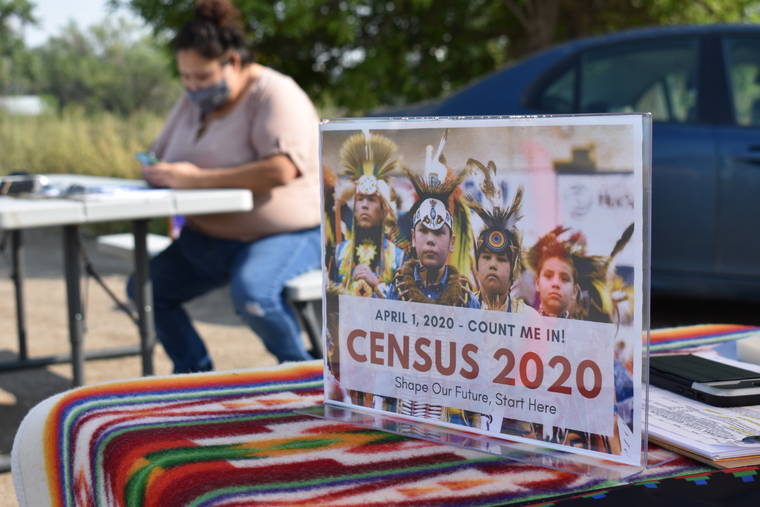ORLANDO, Fla. — The Trump administration on Monday asked appellate judges to immediately suspend a lower court’s order requiring the 2020 census to continue through October, saying decisions by the U.S. Census Bureau over how to conduct the nation’s head count shouldn’t be subject to “judicial second-guessing.”
An attorney for the Trump administration urged the panel of three Ninth Circuit Court of Appeals judges in San Francisco to suspend U.S. District Judge Lucy Koh’s injunction from last month. Sopan Joshi said the head count needed to end Monday in order for the bureau to meet a year-end deadline for turning in numbers used for deciding how many congressional seats each state gets in a process known as apportionment.
Joshi, assistant to the U.S. solicitor general, asked the judges to issue a decision on Monday, or “as promptly as possible,” so the Trump administration can have time to appeal to the U.S. Supreme Court, if need be.
The judges said several hours after the virtual hearing that they would issue a ruling no later than Wednesday afternoon.
Koh’s injunction last month suspended a Sept. 30 deadline for ending the head count as well as a Dec. 31 deadline for turning in apportionment numbers. Her order reverted the deadlines to those of a Census Bureau plan, announced in April in response to the pandemic, that would end field operations on Oct. 31 and report apportionment numbers at the end of April 2021.
Koh also struck down an Oct. 5 end date that the Commerce Department, which oversees the Census Bureau, had pushed after the injunction, saying it violated her order. A previous appellate panel had refused to suspend the order.
The judge sided with civil rights groups and local governments that had sued the Census Bureau and the U.S. Department of Commerce, arguing that minorities and others in hard-to-count communities would be missed if the counting ended in September.
The Trump administration says the judge’s decision ignores the congressionally-mandated deadline requiring the Census Bureau to turn in apportionment numbers by Dec. 31. They also said the local governments and civil rights groups failed to show that accuracy will be compromised if the 2020 census ends early enough for the data to be analyzed before the end of the year.
The once-a-decade census determines how $1.5 trillion in federal spending is distributed annually, as well as how many congressional seats and Electoral College votes each state gets. The Census Bureau reported that, as of Sunday, 99.6% of households nationwide have been counted, although seven mostly southern states haven’t crossed the 99% threshold yet.
In response to the pandemic, the Census Bureau in April proposed extending the deadline for finishing the count from the end of July to the end of October and pushing the apportionment deadline from Dec. 31 to next April. The proposal to extend the apportionment deadline passed the Democratic-controlled House, but the Republican-controlled Senate didn’t take up the request. Then, in late July or early August, bureau officials changed the deadline once again to the end of September.
“They were hoping to get an extension,” Joshi told the judges. “At some point, you have to make a call. You have a December deadline staring you in the face. You hope it gets moved, but at some point you realize it’s not going to move.”
The Republicans’ inaction coincided with a memorandum President Donald Trump issued, which was later ruled unlawful by a panel of three district judges in New York, directing the Census Bureau to exclude from the apportionment count people in the country illegally. The Trump administration is appealing that case to the U.S. Supreme Court.
Not extending the deadline would ensure that the numbers-crunching phase of the 2020 census takes place under the Trump administration, no matter who wins the November presidential election.
The Trump administration acts as if Koh’s order is asking the Census Bureau to violate the law by not complying with the Dec. 31 deadline, but the law also requires the agency to produce a complete and accurate count, said Melissa Sherry, an attorney for the coalition of local governments and civil rights groups.
Congress still has the chance to extend the deadline, and documents supplied by the Census Bureau and the Commerce Department show that the data analysis phase of the census, after the head count, can’t be done by Dec. 31, Sherry said.
“Accuracy matters,” Sherry told the judges. “The fact that they would try to compress data processing is extremely troubling.”
New documents released over the weekend show that the Census Bureau incurred almost $1.5 billion in costs from the pandemic, primarily due to a three-month delay in field operations and leaves for temporary workers. The 2020 census is expected to cost more than $15 billion.
One of the appellate jurists, Judge Marsha Berzon, asked Joshi if unforeseeable circumstances, also called a “force majeure,” like a pandemic could make the Dec. 31 deadline more flexible. Legal contracts sometimes have force majeure clauses that relieve parties from honoring the terms of the deal.
“There is no force majeure clause in the Constitution,” Joshi said.
———
Follow Mike Schneider on Twitter at https://twitter.com/MikeSchneiderAP


